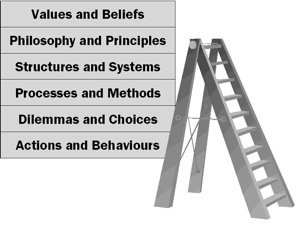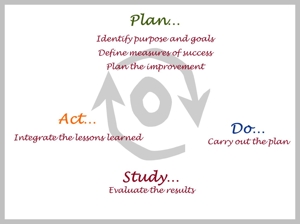Knowledge
Quality Learning involves clarifying and articulating our beliefs as an organisation,
and understanding how they inform our methods.
It also relates to our process for improvement and how we create knowledge
The role of beliefs in our organisation
There is an important relationship between the underpinning beliefs or theories of our organisation, and the methods we use to get the work done.
 This anthropological model (pictured left) describes the hierarchy of influence on organisational behaviour.
This anthropological model (pictured left) describes the hierarchy of influence on organisational behaviour.
Each element of the model is driven by the element above it. The Systems and Structures of an organisation reflect and reinforce its Values, Beliefs and Philosophy. These Systems and Structures in turn, dictate the available Processes and Methods. These lead to the Dilemmas and Choices facing employees in any given situation.
So, for example, if we believe as teachers, we can motivate students to learn; it is likely we will introduce 'carrot and stick' methods to reward and punish behaviour. This might include gold stars, lolly jars, grades, and detention, on the assumption this will motivate the learner to learn.
However, If we believe a learner is intrinsically motivated, we assume they are willing to do their best. Our methods will focus more on the learning environment, how it enables the student to do well, and on removing barriers to intrinsic motivation.
Many organisations focus their improvement efforts at the Actions and Behaviours level.
We have observed that it is rare for organisations to spend time exploring the thinking driving behaviour and performance.
It is only by surfacing and questioning our values and beliefs
(and the assumptions underpinning these theories)
that we can improve our actions and behaviours
Peter Senge describes these underpinning values and beliefs as our mental models. He also emphasises the importance of identifying these models and challenging them.
See an example of a Code of Cooperation to make explicit our values and beliefs relating to behaviour.
Learn more about agreeing on systems and structures.
Plan-Do-Study-Act (PDSA)
In medical practice a hypothesis or working theory is generally agreed upon by consensus across the profession, as to the best current approach to treating an illness. This approach is tested and informed by data collected in terms of the patient’s response to treatment, and the theory thereby affirmed or re-informed.
This is a scientific approach to learning and improvement, based on a continuous cycle of plan-do-study-act.
It is rare to find a scientific approach applied to the practice of managing and improving organisations.
To do so involves taking the time to clarify our theory for improvement (Plan), and implementing this theory (Do). Data are needed to reflect on whether our theory has delivered the desired result (Study). Finally, by capturing the learning, we can ensure the gains are not lost, and we can modify the theory if the desired outcome was not achieved (Act).

Many organisations appear to just ‘do’. Improvement involves flipping from one program or initiative to the next, or blindly copying others, and hoping for the best. This is improvement by wishful thinking rather than scientific method! And in most cases it results in painful change rather than improvement.
Without theory, there is no basis for learning.
Dr W Edwards Deming
The Plan-Do-Study-Act (PDSA) cycle is a structured improvement process.
It supports the development and implementation of robust plans,
and makes sure we reflect on the effectiveness of our efforts to improve
A collaborative and structured approach to action research, PDSA facilitates learning, and improves the success of our improvement efforts. It empowers individuals, teams and organisations.
Learn more about the PDSA Improvement Process
